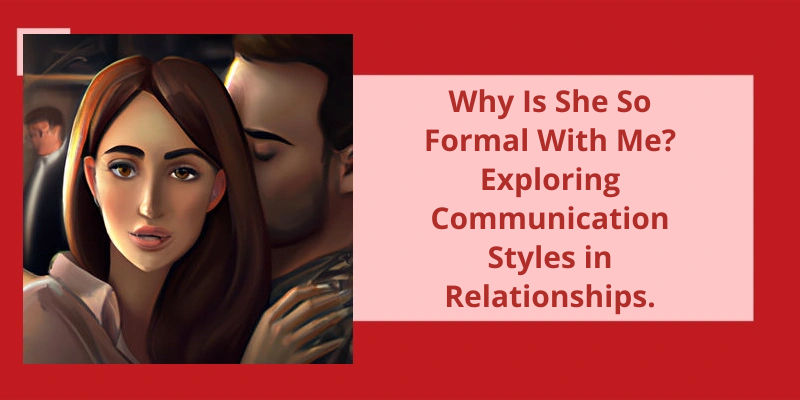As human beings, we’re instinctively wired to read between the lines of social interactions and nonverbal cues. It isn’t uncommon to question why someone is behaving a certain way towards us, especially when their behavior is unexpected or seems out of character. In particular, when someone is being overly formal with us, it can leave us feeling confused and unsure of how to interpret their demeanor. Is their formality an indication of respect, apprehension, or something else entirely? The complexity of interpersonal relationships often makes it difficult to pinpoint the exact reason for someone's behavior, leaving us to rely on our instincts and intuition to determine the appropriate response.
What Makes a Person Formal?
This can manifest in a more traditional, formal demeanor. For example, someone who’s formal in their speech might use more formal language or phrases such as “please” and “thank you.”. They might also speak in a more measured tone, avoiding slang or colloquialisms. Likewise, someone who’s formal in their dress might opt for more conservative, understated clothing instead of flashy or loud pieces.
Formality can also extend to one’s behavior and mannerisms. A formal person might greet others with a handshake or a bow, showing respect and deference. They might also prioritize punctuality and arriving on time to appointments or events. When interacting with others, a formal person might maintain a certain level of distance or professionalism, avoiding overly personal or familiar topics.
How to Adapt to Formal Settings for Job Interviews or Business Meetings
- Dress appropriately for the occasion
- Arrive on time
- Greet everyone with a firm handshake
- Maintain eye contact during conversation
- Speak clearly and articulately
- Listen attentively to others
- Avoid using slang or inappropriate language
- Be prepared with relevant information about the industry/company
- Show enthusiasm and interest in the opportunity
- Thank everyone for their time and consideration
When it comes to communication, being formal is often seen as a sign of respect and professionalism. However, there’s a fine line between being appropriately formal and coming across as stiff or robotic. It’s important to understand what it means to be too formal in order to improve your communication skills and make a positive impression on those around you. So, what does it mean by being too formal? Let’s explore this concept further.
What Does It Mean by Being Too Formal?
Being too formal can sometimes be viewed as a negative trait, especially in social situations. It may give off the impression that someone is rigid or uptight, and unwilling to let loose and relax. In certain professional settings, such as meetings or interviews, formal behavior is expected and can actually be an advantage.
If someone is always overly concerned about following social norms and rules, they may struggle to connect with others on a deeper level. This can lead to a lack of authenticity and trust in relationships, which is important for building healthy and meaningful connections with others.
It shows respect for the situation and the people involved, and can help establish trust and credibility with others. Additionally, being well-versed in formal conventions such as proper dress and language can give someone an advantage in certain business environments.
It may prevent someone from expressing themselves fully, or prevent them from taking risks and trying new things. In order to strike a balance, it’s important to understand when and where formal behavior is appropriate, and be willing to adjust accordingly.
By understanding the context and expectations of different situations, individuals can make informed decisions about how they present themselves and interact with others. Ultimately, it’s about finding a balance between following proper etiquette and conventions, while still allowing room for personal expression and authenticity.
Practical Tips for Maintaining a Balance Between Formality and Informality in Different Situations.
- Observe the communication style of the people around you and adapt accordingly.
- Understand the context of the situation and adjust your level of formality accordingly.
- Use appropriate language and tone for the particular setting and the people involved.
- Avoid using slang or colloquialisms in professional settings.
- Be respectful and courteous to others, regardless of the level of formality.
- Know when it’s acceptable to break the rules and inject some informality into a situation.
- Remember that balancing formality and informality is about finding the right level of comfort, respect, and effectiveness.
Source: Formal – Definition, Meaning & Synonyms – Vocabulary.com






